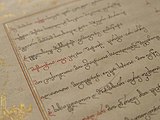Svans: Difference between revisions
similarly of the Mingrelians |
No edit summary |
||
| Line 1: | Line 1: | ||
{{about|a people in the Caucasus|other meanings|Svans (disambiguation)}} |
{{about|a people in the Caucasus|other meanings|Svans (disambiguation)}} |
||
{{Georgians}} |
{{Georgians}} |
||
The '''Svans''' ({{lang-ka|სვანი, ''Svani''}}) are a subethnic group of [[Georgians]] |
The '''Svans''' ({{lang-ka|სვანი, ''Svani''}}) are a subethnic group of [[Georgians]]<ref>Levinson, David. Ethnic Groups Worldwide: A Ready Reference Handbook. Phoenix: Oryx Press, 1998. p 34</ref><ref>[[Stephen F. Jones]]. [http://www.everyculture.com/Russia-Eurasia-China/Svans-Orientation.html Svans]. ''World Culture Encyclopedia''. Retrieved on March 13, 2011</ref><ref name="joshuaproject">[http://www.joshuaproject.net/people-profile.php?peo3=19064&rog3=GG joshuaproject]</ref><ref>[http://www.ethnologue.com/show_family.asp?subid=1194-16 Ethnologue. Language Family Trees]-[http://www.ethnologue.com/show_language.asp?code=sva Svan]</ref><ref>[[Stephen F. Jones]]: [http://www.everyculture.com/Russia-Eurasia-China/Svans-Orientation.html Svans]</ref><ref>[http://www.mapageweb.umontreal.ca/tuitekj/publications/Svans.pdf The Svans] Kevin Tuite ''Université de Montréal'' 1992</ref> living mostly in [[Svaneti]], a region in northwest [[Georgia (country)|Georgia]]. They speak the [[Svan language]], and are mostly bilingual also in [[Georgian language|Georgian]]. Both these languages belong to the [[Kartvelian languages|Kartvelian (South Caucasian) language family]].. The self-designation of the Svan is '''Mushüan''', which is probably reflected in the ethnonym Misimian of the Classical authors.<ref>History of Georgian Mountein Regions / R. Topchishvili. Available at [http://www.nplg.gov.ge The National Parliamentary Library of Georgia]</ref> |
||
==History== |
==History== |
||
[[File:Kartvelian languages.svg|thumb|left|Distribution of the Svan language in relation to other Kartvelian (South Caucasian) languages.]] |
[[File:Kartvelian languages.svg|thumb|left|150px|Distribution of the Svan language in relation to other Kartvelian (South Caucasian) languages.]] |
||
[[Image:Old peasant with dagger and long smoking pipe, Mestia, Svanetia, Georgia (Republic).jpg|thumb|left|150px|Svan with dagger and long smoking pipe. [[Mestia]] (1888 -1900)]] |
[[Image:Old peasant with dagger and long smoking pipe, Mestia, Svanetia, Georgia (Republic).jpg|thumb|left|150px|Svan with dagger and long smoking pipe. [[Mestia]] (1888 -1900)]] |
||
[[File:Dadeshkeliani family in Mazeri (E. Platz).jpg|thumb|left|150px|[[House of Dadeshkeliani]], royal ruling class of [[Principality of Svaneti|Svaneti]].]] |
[[File:Dadeshkeliani family in Mazeri (E. Platz).jpg|thumb|left|150px|[[House of Dadeshkeliani]], royal ruling class of [[Principality of Svaneti|Svaneti]].]] |
||
Revision as of 15:06, 18 May 2012
| Part of a series on |
| Georgians ქართველები |
|---|
 |
| Nation |
| Georgia |
| Ancient Kartvelian people |
| Subgroups |
| Culture |
| Languages |
| Religion |
| Symbols |
| History of Georgia |
The Svans (Georgian: [სვანი, Svani] Error: {{Lang}}: text has italic markup (help)) are a subethnic group of Georgians[1][2][3][4][5][6] living mostly in Svaneti, a region in northwest Georgia. They speak the Svan language, and are mostly bilingual also in Georgian. Both these languages belong to the Kartvelian (South Caucasian) language family.. The self-designation of the Svan is Mushüan, which is probably reflected in the ethnonym Misimian of the Classical authors.[7]
History



The Svans are usually identified with the Soani mentioned by Greek geographer Strabo, who placed them more or less in the area still occupied by the modern-day Svans.
In the Russian Empire and early Soviet Union Mingrelians and Svans had their own census grouping, but were classified under the broader category of Georgian thereafter in the 1930s. They are Georgian Orthodox Christians, and were Christianized in the 4th-6th centuries. However, some remnants of old paganism have been maintained. Saint George (known as Jgëræg to the locals), a patron saint of Georgia, is the most respected saint. The Svans have retained many of their old traditions, including blood revenge (although this tradition has been declining over time, as law enforcement takes hold). Their families are small, and the husband is the head of his family. The Svan strongly respect the older women in families.
Language
Typically bilingual, they use both Georgian and their own, unwritten Svan language, which together with the Georgian, Mingrelian, and Laz languages constitute the Kartvelian language family. The Svan language is being largely replaced by Georgian.
Culture
Svan culture survives most wonderfully in its songs and round dances. Svaneti boasts archaic three part polyphony, known as chordal unit polyphony, with strong dissonant harmonies. Traditional Svan poetry is still not separated from song and has no rhymed poetry. Svans are skillful artists and as Svaneti was widely regarded as the most inaccessible region of Georgia, many items of medieval Georgian state treasury (including the rare manuscripts of the bible) are still stored in Svaneti.
Famous Svans
References
- ^ Levinson, David. Ethnic Groups Worldwide: A Ready Reference Handbook. Phoenix: Oryx Press, 1998. p 34
- ^ Stephen F. Jones. Svans. World Culture Encyclopedia. Retrieved on March 13, 2011
- ^ joshuaproject
- ^ Ethnologue. Language Family Trees-Svan
- ^ Stephen F. Jones: Svans
- ^ The Svans Kevin Tuite Université de Montréal 1992
- ^ History of Georgian Mountein Regions / R. Topchishvili. Available at The National Parliamentary Library of Georgia

